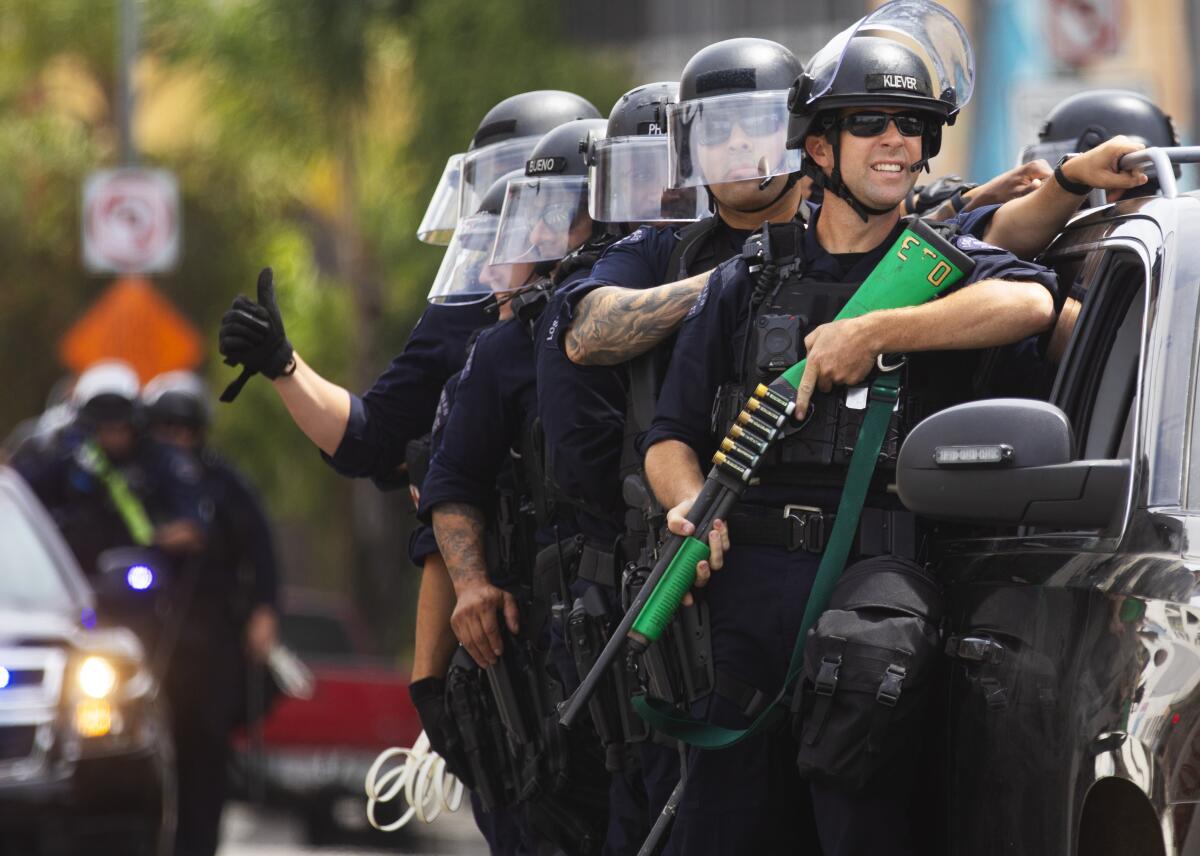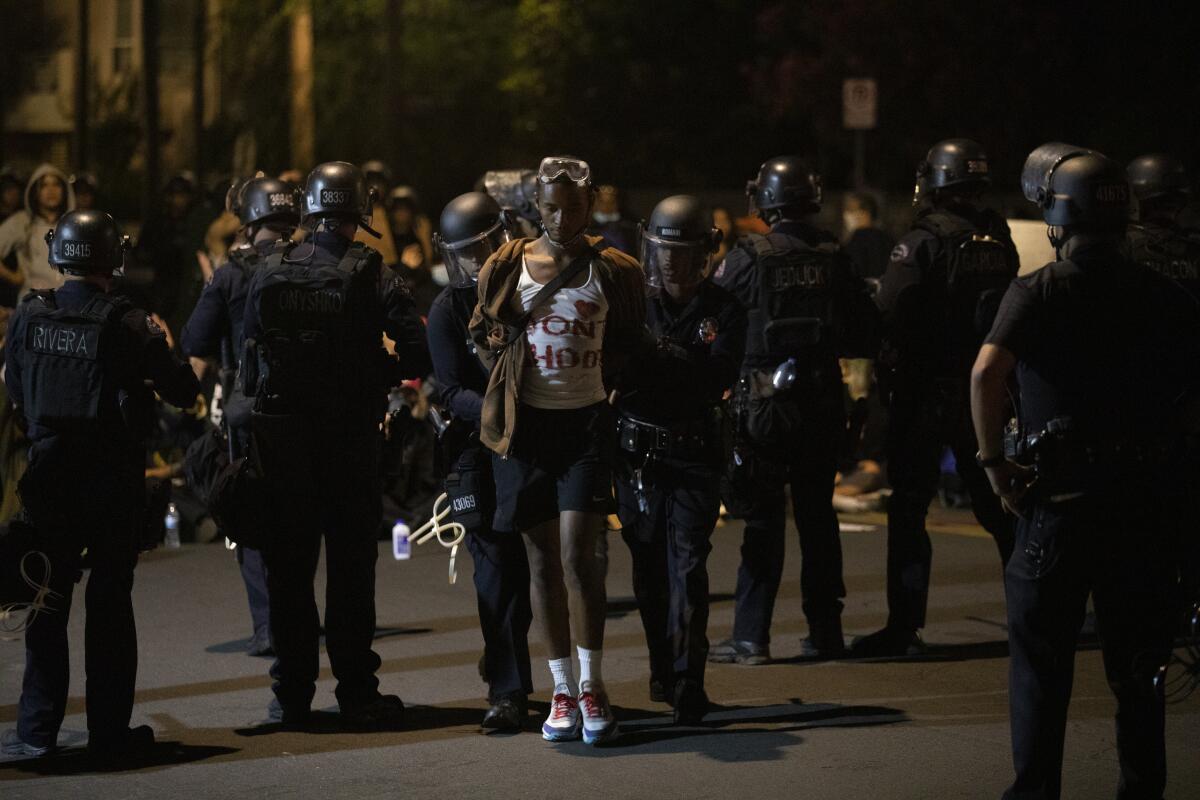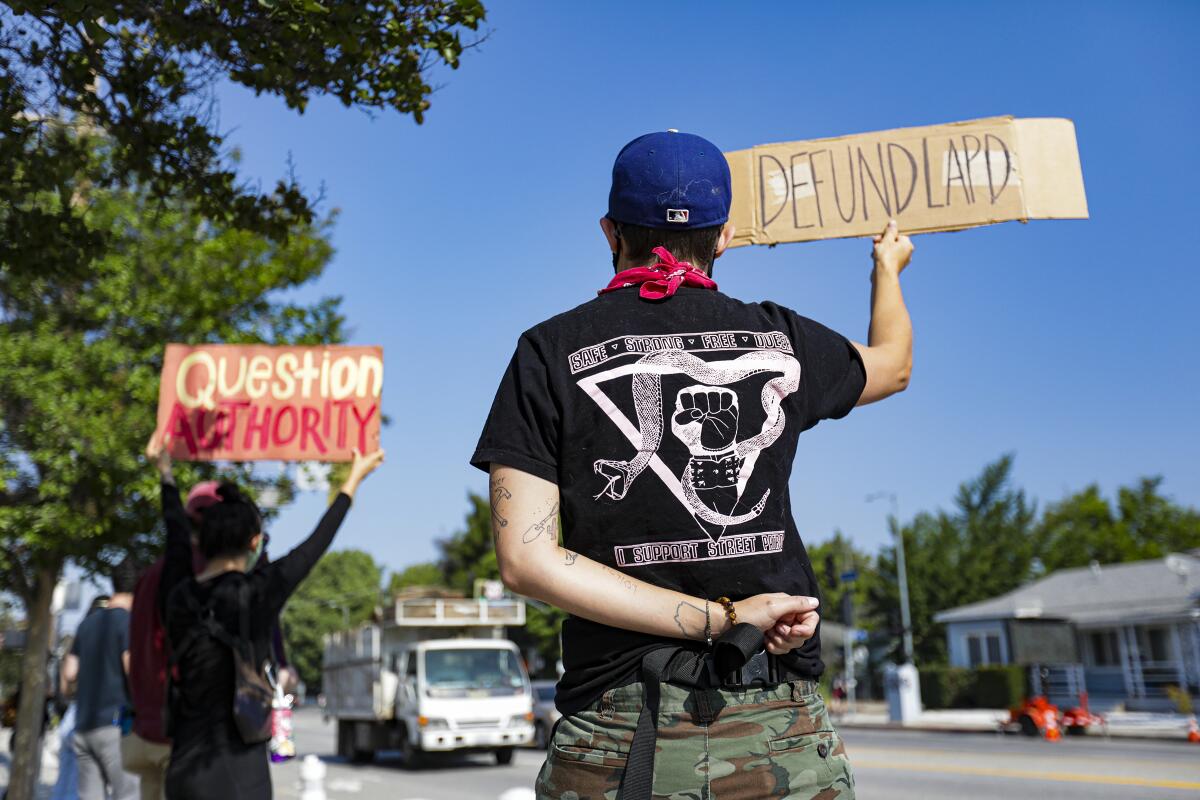California voters overwhelmingly support sweeping police reforms, new poll finds

- Share via
After weeks of protests in the wake of George Floyd’s death, a new poll shows that a majority of Californians support sweeping reforms to law enforcement — including measures that would make it easier to prosecute and sue police officers, limit the negotiating power of police unions and shift police funding to social workers and mental health providers.
The backing for such measures comes amid growing concern about race relations in the state, the poll found, and despite the fact that a majority of respondents expressed some satisfaction with their local police force.
“The data suggest that there’s widespread public concern about police practices,” said Eric Schickler, co-director of UC Berkeley’s Institute of Governmental Studies, which conducted the poll of likely voters at the end of July. “For many voters, that does not translate into a simple condemnation of police but a more nuanced position that reforms are needed.”
G. Cristina Mora, Schickler’s co-director, said the data show that people still trust their local cops, but it is “not a blind trust.”
Across California, 80% of respondents favored passing laws that would make it easier to prosecute police officers who use excessive force, 78% favored banning officers from using chokeholds and strangleholds when detaining suspects, 70% favored granting civilians the right to sue officers for misconduct and excessive force, and 61% favored limiting the power of police unions by reducing their collective bargaining rights.
In Los Angeles County, where satisfaction with police was significantly lower than it was in other parts of the state, a majority of respondents — 63% — still reported being “very satisfied” or “somewhat satisfied” with the work of their local police force. The data did not distinguish between specific agencies or isolate the city of L.A. from the rest of the county.
At the same time, nearly three-quarters of county respondents favored redirecting police funding to other agencies for incidents involving substance abuse, mental illness and homelessness, and a similar percentage said it should be easier for civilians to sue officers.
Statewide, 63% of respondents had a favorable view of the Black Lives Matter movement, and 70% agreed that Black people in California are more likely to experience police violence than white people. In L.A. County, those figures were 67% and 72%, respectively.

“It definitely sounds like a victory for the protests. It sounds like our messaging was heard,” said Melina Abdullah, a co-founder of Black Lives Matter-L.A. and a leader at recent demonstrations.
An LAPD spokesman did not respond to a request for comment on the polling data.
Lt. Craig Lally, president of the union that represents LAPD officers, said he was not surprised that a majority of respondents reported being satisfied with the work of their local police, because similar results are routinely found in polling at the national level.
Police unions hold sway because police are popular, he said, and they shouldn’t be targeted for negotiating just like other public-sector unions.
He said police also would like to see some of their responsibilities shifted to other agencies, but he has yet to see a coherent explanation as to how such changes would work — or what social workers or mental health providers will do when incidents to which they have responded suddenly turn violent.
“They’ve put the cart before the horse,” he said of activists and public officials who have pushed for a “re-imagining” of public safety in recent months.
While some activists have called for abolishing police altogether, others have educated Californians on the nuances of a “defunding” platform that calls for reallocating a proportion of police funding toward alternative mental health and other social services while retaining police to address and respond to violent crime.
Protests raged across Los Angeles and cities nationwide following the May 25 death of Floyd, a Black man who was killed when a white Minneapolis police officer knelt on his neck.
Since then, the “defund” platform has gone mainstream, and many cities, including Los Angeles, have begun to implement changes. The Democrat-controlled L.A. City Council recently cut $150 million from the budget of the Los Angeles Police Department, and LAPD commanders are contemplating a future in which more of their duties are shifted to other agencies.
Meanwhile, some Republicans and other police supporters have attempted to cast the movement to defund the police as an existential threat to law and order and a harbinger of chaos on the streets and upticks in crime.
Schickler said the latest polling data reflect some familiar fault lines among voters, with white people expressing far more support for police than Latino and Black respondents, conservatives expressing more support for police than liberals, and older residents expressing more support for police than younger ones.
Overall satisfaction with police was highest in Orange County, where 50% of respondents said they were “very satisfied,” compared with 26% in Los Angeles County.
The data show a broad base of support for specific reforms — and a level of intellectual sophistication among voters on law enforcement issues that could inform policymakers moving forward, Schickler said. While a wholesale rejection of policing likely wouldn’t enjoy widespread support, specific reforms would, he said.
“When it comes to a lot of the specific proposed reforms or potential reforms on policing, you see really wide-ranging support,” he said.
Abdullah’s group had called for a dramatically larger cut to the LAPD budget, and she said the new polling seems to reflect a desire among the public for greater change than has occurred to date.

“People are ready for more transformative change, rather than tinkering around the edges,” she said. “That is what the defunding call is about — larger-scale change — and it sounds like people are ready to move in that direction.”
Statewide, 83% of respondents said they were concerned about race relations in the state, with 49% saying they were “extremely concerned.” In a similar poll in 2010, just 14% said they were “extremely concerned.” In the new poll, 70% of Black respondents said they were “extremely concerned,” compared to 45% of white respondents, 50% of Asian and Pacific Islander respondents and 54% of Latino respondents.
Abdullah said differences in how people of various races responded to the poll questions are telling.
While 74% of white people, 64% of Latino people and 72% of Asian people and Pacific Islanders said they were “very satisfied” or “somewhat satisfied” with their local police, 50% of Black people said they were satisfied. While 70% of white people, 67% of Latino people and 75% of Asian people and Pacific Islanders said they felt Black people are more likely to experience police violence, 92% of Black people felt that way.
Abdullah said the gaps were not surprising but nonetheless “stark.”
“Those who most experience police corruption, abuse and violence are Black people,” Abdullah said. “We’re the closest to that, so we have the highest levels of dissatisfaction with police.”
The poll was conducted via email in English and Spanish from July 21 to July 27 among 8,328 registered voters in California. It did not include input from undocumented residents. Researchers estimated that the findings are subject to a sampling error of plus or minus 2%.
More to Read
Sign up for Essential California
The most important California stories and recommendations in your inbox every morning.
You may occasionally receive promotional content from the Los Angeles Times.











